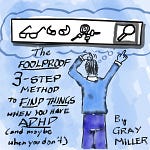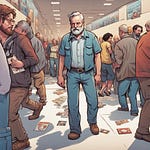“You know the scene in The Expanse where the Martian interrogator takes a pill before questioning, and his eyes sharpen and everything comes into focus and he can sense even the slightest micro-expression on the prisoner’s face?” I said to him. “That’s what I imagine adderall is like.” I paused, thinking a bit, then added, “Or maybe like the pill in Limitless.”
That’s the advantage to talking with an old friend sitting at a bar; like me, he’s watched too many science-fiction movies, including ones with magic pills.
He’s been on ADHD meds for years, in several different forms, and at the time I was still debating whether to try treating my recently-diagnosed ADHD with med or not.
He shook his head with the authority of experience. “Then, my friend, you are in for a world of disappointment.”
Hearing about his experience with ADHD meds, as well as that of many other people who shared their stories with me in person and online, helped me make a more informed decision about whether to start the medication, and how I took it once I did.
This is only my own experience. I’m not a doctor, and there are a thousand different stories and experiences people have with ADHD, including “it didn’t work at all” and “it was the worst thing ever.”
I’m just adding my own anecdata to the pile, because it might help someone the way others stories helped me.
Turns out, “human” is super enough.
He was right, of course. A month later, when I did take that first dose, there was no transcendent experience of superhuman capacity.
Instead, what I got was the realization that I’d been operating under capacityfor most of my life.
Put simply, everything suddenly seemed a lot easier. My list of tasks didn’t change; it simply didn’t feel like a fight to get through them. I still had to do the tedious database-and-spreadsheet tasks that are my least-favorite part of my job, but they seemed less tedious.
I had been worried about anger management; I’d heard from some people that adderall just basically turned them into a**holes, and I’ve struggled with that in my own life.
Instead, I found my emotions much more easy to handle. Not just anger, but everything just seemed less annoying. For example, there was a moment working with a colleague when their pen ran out of ink.
I felt the surge of joy I get when I can help someone as I offered my pen, knowing that I had a spare with me specifically for this kind of situation (it has nothing to do with justifying buying more pens. I swear.)
“No, thanks,” they said. “I’ll just find one of my own.”
In that instant, I felt my inflating self-image of Gray, Incredibly Useful Provider of Writing Instruments punctured and instantly deflated. I braced myself for the sudden decline of self-esteem, for the wave of annoyance (How DARE you reject my generous offer of this fine pen?).
And it didn’t come. The emotions were simply: Oh, they didn’t want my pen. OK. Followed by some brief questioning of my tendency to want to make big gestures of generosity and service in order to make myself feel better aboutmyself.
If you’re reading this and thinking What’s the big deal? It was just a pen! then you understand exactly: for most people, it is just a pen.
But my brain, unmedicated, would all-too-often take “just a pen” situations and make a huge deal out of them, internally. I would try hard not to let it show (my partner will tell you I’m not as good at that as I think I am).
That inner turmoil plus the effort to mask it — to appear “normal” — is a lot of work. I never realized just how tiring it was until I started taking that pill.
But it won’t make bad days better.
There were a few nights when I didn’t get enough sleep. Either I’d let myself stay up too late, or woke during the night, or way too early with my brain racing.
Before meds, when that happened — if my total sleep time was less than six hours — I’d just kind of down-shift.
That looked like only doing the most essential things during the day, and letting the rest slide. That wasn’t laziness, it was strategic: I know, from hard-learned lessons, that if I try to do All the Things when I’m hollowed-out from lack of sleep, Most the Things will be Pretty Crappy.
So instead, I take what reserves I have, make sure the essentials are done well, and let the rest slide to the next day when I’ve (hopefully) gotten more rest.
Like I’d said to my friend, I’d had some hope that the meds would fix that.
Like he’d said to me, I was sorely disappointed.
The first time I’d taken my adderall on a sleep-deprived day, I discovered the horrifying truth: I was still at a reduced capacity to do things well, but I couldn’t downshift. The stimulant kept me awake and focused — but focused on the fact that I felt tired and burned out, all day long.
A friendly VA speech pathologist told me the simple solution to this when I described it to him. “You’ll have good days, and you’ll have bad days,” he said, referring to the sleep. “On the bad days — don’t take the meds.”
Simple as that.
It takes more than just meds.
The best analogy I could come up with for how my ADHD meds work is to say that it’s like strapping a two-cylinder engine to the back of my head.
My brain is going to go faster — but it’s going to go faster in whatever direction I point it, so I have to be careful where I direct my (hyper) focus.
I used to have a very complex morning routine, full of things designed to jumpstart my brain into work-mode and improve my productivity.
Now, it’s much simpler, with less disciplined “self-improvement” hacks and more gentle stimulation for my brain — reading fiction, drinking tea, writing, watching late-show clips with my partner over breakfast.
My brain craves dopamine the way an engine craves gasoline, and what I did before was like cold-starting the engine and forcing it to run at high-revs without letting it warm up.
If I instead let my brain warm up, gently feed it stimulation before making it perform executive functions, it makes for a much better morning.
About forty-five minutes before starting work, I’ll take my adderall.
That gives it time to start working in time for my morning planning session. I think of that as setting the course, checking the rudder, looking out for bad weather.
By the time I’m wanting to wind down in the evening, the meds have worn off. I’ve been very fortunate; none of the bad side effects I’ve heard about from friends and online accounts seem to be affecting me.
Of course, this is at the two-month mark. There’s a shelf-life to this experience.
Like many meds, adderall is something my body will eventually adjust to, necessitating higher dosages to have the same effect. That’s perhaps the one grim upside to being diagnosed so late in life; I likely won’t live long enough for the dosages to get into the triple-digits. Yay me!
However, as someone who was very skeptical about taking meds, I have no regrets.
Now, when I look at my schedule, to-do list, inbox, or hit one of those emotional speed-bumps that used to derail my day, it’s not overwhelming. It’s just a thing, the way it should be.
Adderall doesn’t make me superhuman. It just gives me more room to be the me I want to be.
Afterword: see transcript.
Related podcast/post:
How TIIMO Can Help You Manage Your Time and Relieve Anxiety
Listen now (17 mins) | Exciting news! As promised, Early Bird Registration for the ADHD Open Space event is OPEN! More details in the podcast, or by clicking on the link below: Raise your hand if any of these phrases sound familiar: “Oh, %$#@, it started five minutes ago!”














